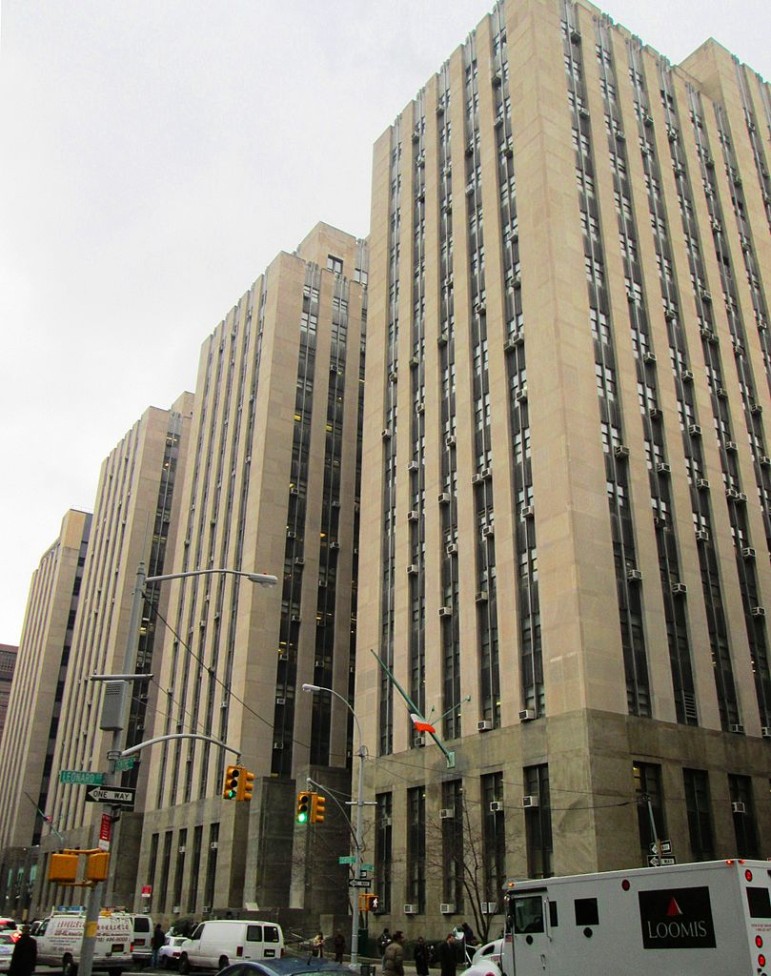
Beyond My Ken
The New York Criminal Courts building at 100 Centre Street.COVID-19 has upended every aspect of public life. It has also exposed and exacerbated the racial and economic disparities that have long existed in this city. Our legal systems are no different in that regard. Even as some court functions have slowed down, our legal systems continue to target and ensnare low-income New Yorkers.
‘Social distancing’ has become the latest pretext for Black and brown New Yorkers to be profiled, harassed, and arrested by the NYPD. The Administration for Child Services (ACS) is still separating children from their parents rather than providing them with the support they need. ICE continues to enforce this administration’s anti-immigrant policies. Evictions may be on pause, but longer-term relief for tenants has not materialized and people still live under fear of losing their homes.
As the City Council considers how to budget and best plan fiscally for the future, it must do so with a clear focus on ensuring that low-income New Yorkers have access to the help they need. One important way of doing so is to preserve funding for the public defenders who are fighting harder than ever to protect rights, provide support, and advocate for a more just future.
 CityViews are readers’ opinions, not those of City Limits. Add your voice today!
CityViews are readers’ opinions, not those of City Limits. Add your voice today!
Public defenders have responded to the impossible challenges the pandemic poses not by taking a step back or scaling back operations, but by mobilizing to meet the evolving needs of our clients. We sounded the alarm on the humanitarian crisis unfolding on Rikers Island and within ICE detention facilities as the virus spread, and have worked tirelessly to secure the release of hundreds of our medically vulnerable people. We have fought to reunite as many families in the child welfare system as possible. We have defended at administrative hearings to preserve employment licenses and have helped thousands of people obtain life-sustaining benefits, shelter, and food.
The reality is, there are massive differences in the ways New Yorkers are experiencing the pandemic. For many wealthy New Yorkers, the quarantine is more inconvenience than anything else. It has meant fleeing to country homes and adjusting to working remotely, but it is ultimately a crisis they can wait out without worrying about putting food on the table, paying rent, or having the NYPD, ACS, or ICE knock on their door.
It is that “other’”New York that our leaders must stand up for now more than ever. The people we represent and fight for every day. People like our predominantly low-income Black and brown ‘essential’ workforce, for whom the coronavirus pandemic has meant putting themselves in harm’s way in order to make sure this city continues to function for everyone else. People like our newly unemployed neighbors who are now trying to figure out how far they can stretch their unemployment benefits, and worrying about what happens when the eviction moratorium ends, and how to continue feeding their families. People who are the most vulnerable among us–the incarcerated, or homeless, or those in need of mental health services–these are the New Yorkers for whom COVID-19 poses not an inconvenience, but an existential threat. For them, every public policy decision the city makes – whether it’s closing the subway, slowing the courts down, or cutting funding for critical legal services – can create chaos.
Our role has always been to serve as advocates for low-income people, to help them navigate a system that was not set up to serve them. The defenders working as criminal, immigration, family, or civil advocates are doing more than just providing free legal counsel. We are providing a crucial lifeline for vulnerable New Yorkers, making sure that no one has to go through this on their own.
In times of crisis, we cannot allow the rights and needs of the most vulnerable among us to be invisible. These are also the New Yorkers we represent and fight for every day. They’re who our leaders must stand up for now.
That’s why we’re urging the City Council to maintain funding for public defenders and help ensure that low-income New Yorkers have the support and services they need, and have access to justice that others take for granted.
Justine Olderman is the executive director of the Bronx Defenders. Lisa Schreibersdorf is the executive director of Brooklyn Defender Services. Tina Luongo is the attorney-in-charge of the Criminal Defense Practice at the Legal Aid Society. Alice Fontier is the managing director of the Neighborhood Defender Service of Harlem. Stan German is the of New York County Defender Services. Lori Zeno is the executive director of Queens Defenders.







